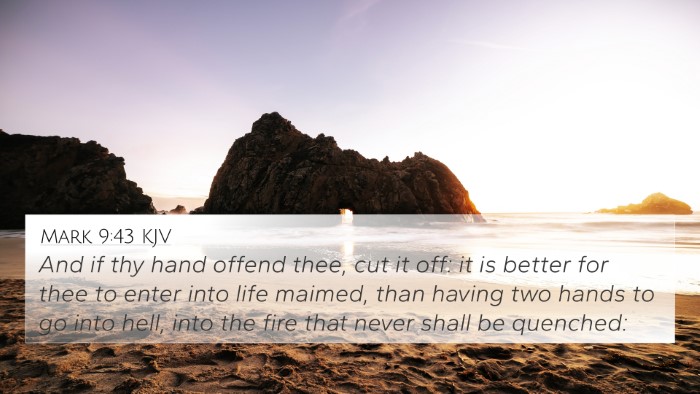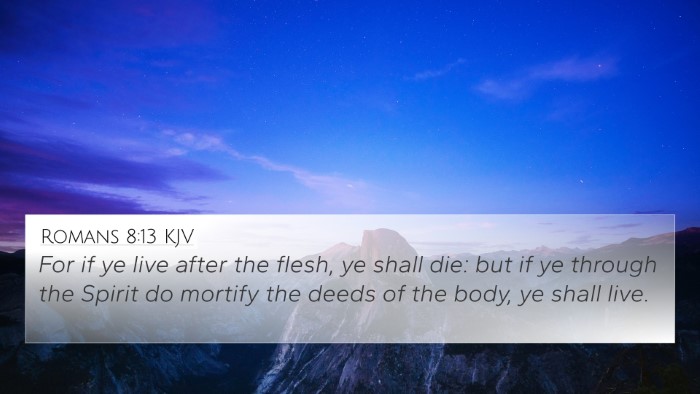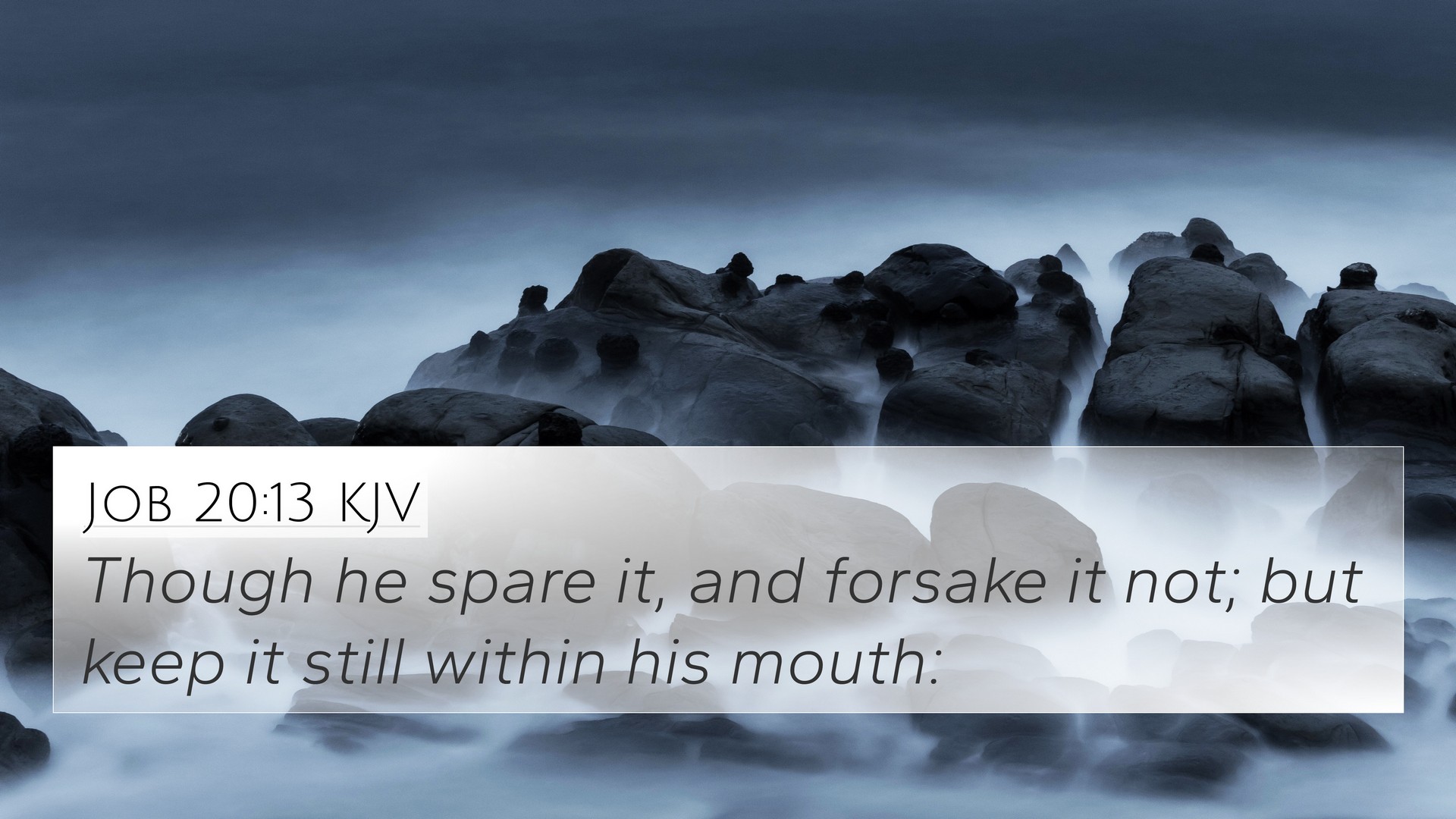Old Testament
Genesis Exodus Leviticus Numbers Deuteronomy Joshua Judges Ruth 1 Samuel 2 Samuel 1 Kings 2 Kings 1 Chronicles 2 Chronicles Ezra Nehemiah Esther Job Psalms Proverbs Ecclesiastes Song of Solomon Isaiah Jeremiah Lamentations Ezekiel Daniel Hosea Joel Amos Obadiah Jonah Micah Nahum Habakkuk Zephaniah Haggai Zechariah MalachiJob 20:13 Similar Verses
Job 20:13 Cross References
Though he spare it, and forsake it not; but keep it still within his mouth:
Uncover the Rich Themes and Topics of This Bible Verse
Listed below are the Bible themes associated with Job 20:13. We invite you to explore each theme to gain deeper insights into the Scriptures.
Job 20:13 Cross Reference Verses
This section features a detailed cross-reference designed to enrich your understanding of the Scriptures. Below, you will find carefully selected verses that echo the themes and teachings related to Job 20:13 KJV. Click on any image to explore detailed analyses of related Bible verses and uncover deeper theological insights.

Numbers 11:18 (KJV) »
And say thou unto the people, Sanctify yourselves against to morrow, and ye shall eat flesh: for ye have wept in the ears of the LORD, saying, Who shall give us flesh to eat? for it was well with us in Egypt: therefore the LORD will give you flesh, and ye shall eat.

Matthew 5:29 (KJV) »
And if thy right eye offend thee, pluck it out, and cast it from thee: for it is profitable for thee that one of thy members should perish, and not that thy whole body should be cast into hell.

Mark 9:43 (KJV) »
And if thy hand offend thee, cut it off: it is better for thee to enter into life maimed, than having two hands to go into hell, into the fire that never shall be quenched:

Romans 8:13 (KJV) »
For if ye live after the flesh, ye shall die: but if ye through the Spirit do mortify the deeds of the body, ye shall live.
Job 20:13 Verse Analysis and Similar Verses
Understanding Job 20:13
Job 20:13 states: "Though he spare it, and forsake it not; but keep it still within his mouth." This verse appears during the discourse of Zophar, one of Job's friends, who is articulating the fated downfall of the wicked.
Contextual Overview
The book of Job delves into themes of suffering, justice, and the dialogue surrounding the nature of God's providence. In this specific passage, Zophar is emphasizing the deceitfulness of the wicked, symbolized through the metaphor of a sweet morsel in the mouth.
Commentary Insights
- Matthew Henry: He interprets Zophar's message as highlighting the fleeting joys and inevitable decline that accompany a sinful life. The phrase "keep it still within his mouth" suggests a temporary pleasure that will ultimately lead to bitterness.
- Albert Barnes: Barnes analyzes this metaphor further, indicating that retaining such pleasures will not sustain the wicked; they will eventually experience remorse and suffering. He emphasizes that the momentary delight of sin is contrasted with the grim reality of consequence.
- Adam Clarke: Clarke expands on the idea that the "morsel" signifies the allure of sin, which once tasted, leads to an inescapable downfall. He suggests that both the enjoyment and the eventual rejection of sin are part of the moral teachings of the text.
Thematic Connections
This verse illustrates profound themes within the Bible, specifically the nature of sin and its repercussions. This aligns with various other scriptures:
- Proverbs 13:15: "Good understanding giveth favor: but the way of transgressors is hard." - Highlighting the harsh reality of choosing a sinful path.
- James 1:14-15: "But every man is tempted, when he is drawn away of his own lust, and enticed. Then when lust hath conceived, it bringeth forth sin: and sin, when it is finished, bringeth forth death." - Sin's progression leads to death.
- Galatians 6:7: "Be not deceived; God is not mocked: for whatsoever a man soweth, that shall he also reap." - The inevitability of reaping what one sows is echoed here.
- Psalms 37:38: "But the transgressors shall be destroyed together: the end of the wicked shall be cut off." - A proclamation regarding the fate of the wicked.
- Romans 6:23: "For the wages of sin is death; but the gift of God is eternal life through Jesus Christ our Lord." - Contrast between sin and divine grace.
- Ezekiel 18:30: "Therefore I will judge you, O house of Israel, every one according to his ways, saith the Lord God. Repent, and turn yourselves from all your offenses; so sin will not be your downfall." - An encouragement to turn from sin.
- 2 Peter 2:20: "For if after they have escaped the pollutions of the world through the knowledge of the Lord and Saviour Jesus Christ, they are again entangled therein, and overcome, the latter end is worse with them than the beginning." - The danger of returning to sin.
Cross-Referencing Biblical Texts
When studying Job 20:13, cross-referencing related verses enhances understanding of its themes. Effective tools for Bible cross-referencing include Bible concordances and Bible reference resources which aid in identifying connections between Old and New Testaments and examining parallels in scripture.
Applying Insights
Through cross-referencing Bible studies, readers can draw parallels not only within the book of Job but also across scriptural narratives about the nature of sin and its consequences. This promotes deeper engagement and understanding of Biblical texts.
Conclusion
Job 20:13 encapsulates the transient pleasures of sin that lead to unavoidable consequences. By engaging with public domain commentaries and cross-referencing with other Scriptures, one can gain a richer appreciation of this theme embedded in the biblical narrative.


